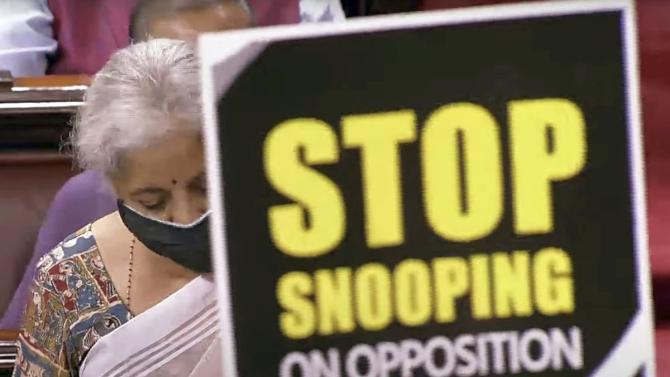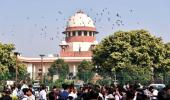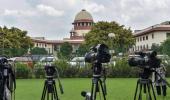"Justice must not only be done, but also be seen to be done," the Supreme Court observed on Wednesday while declining the Centre's plea to allow it to appoint an expert committee to probe the allegations of use of spyware Pegasus for surveillance of certain people in India.

Such a course of action would violate the settled judicial principle against bias, the apex court said.
While appointing a three-member expert panel to investigate the matter, the top court noted seven compelling circumstances, including the allegations that the Centre or the state governments are party to the purported deprivation of rights of the citizens, that weighed with the court to pass the order.
A bench headed by Chief Justice N V Ramana said one of the compelling circumstances was that right to privacy and freedom of speech of the citizens are alleged to be impacted, which needs to be examined.
“It is for reason (vi) above that we decline the Respondent-Union of India's plea to allow them to appoint an expert committee for the purposes of investigating the allegations, as such a course of action would violate the settled judicial principle against bias, i.e., that ‘justice must not only be done, but also be seen to be done',” said the bench, which also comprised Justices Surya Kant and Hima Kohli.
The top court passed a 46-page order on a batch of pleas seeking independent probe into the alleged Pegasus snooping matter.
The compelling circumstances noted as (vi) in the order reads – "allegations that the Union or state governments are party to the rights' deprivations of the citizens."
The top court said the other compelling circumstances that have weighed with it to pass such an order are -- the entire citizenry is affected by such allegations due to the potential chilling effect, no clear stand taken by the Centre regarding actions taken by it, seriousness accorded to the allegations by foreign countries and involvement of foreign parties, possibility that some foreign authority, agency or private entity is involved in placing citizens of India under surveillance.
“Limitation under writ jurisdiction to delve into factual aspects. For instance, even the question of usage of the technology on citizens, which is the jurisdictional fact, is disputed and requires further factual examination,” it noted.
The bench said the petitioners in the matter have placed on record certain material that prima facie merits consideration by the court and there has been no specific denial of any of the facts averred by them by the Centre.
“There has only been an omnibus and vague denial in the ‘limited affidavit' filed by the respondent Union of India, which cannot be sufficient. In such circumstances, we have no option but to accept the prima facie case made out by the petitioners to examine the allegations made,” it said.
It said that during the arguments, one of the petitioners had sought an interim order directing the cabinet secretary to put certain facts on an affidavit.
The bench said in the circumstances of the case, when the Centre has already been given multiple opportunities to file an affidavit on record and 'looking to the conduct' of the Union of India in not placing on record any facts through their reliance on the 'national security defense,' no useful purpose would be served by issuing directions of the nature sought by the petitioner, apart from causing a further delay in the proceedings.
It said different forms of surveillance and data gathering by intelligence agencies to fight terrorism, crime and corruption in the national interest and/or for national security, are accepted norms all over the world.
The bench noted that the petitioners do not contend that the state should not resort to surveillance or collection of data in matters of national security and their complaint is about the misuse or likely misuse of the spyware in violation of the right to privacy of citizens.
“The respondent-Union of India also does not contend that its agencies can resort to surveillance/ collection of data relating to its citizens where national security and national interest are not involved. The apprehension of the respondent-Union of India is that any inquiry in this behalf should not jeopardize national security and the steps taken by it to protect national security,” it said.
“There is thus a broad consensus that unauthorised surveillance/accessing of stored data from the phones and other devices of citizens for reasons other than nation's security would be illegal, objectionable and a matter of concern,” the top court said.
The pleas seeking independent probe are related to reports of alleged snooping by government agencies on eminent citizens, politicians and scribes by using Israeli firm NSO's spyware Pegasus.
An international media consortium had reported that over 300 verified Indian mobile phone numbers were on the list of potential targets for surveillance using Pegasus spyware.










